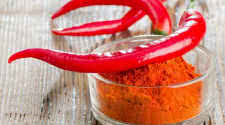Spicy Foods for Fat Burning - Can We Burn Fat Eating Herbs & Spices

Various Foods have Various Results on your Fitness Goals
What can make your head feel like it's going to explode, kick your sweat glands into overdrive, make your nose run and help you burn fat? No, not a
500-pound squat in this case, but a little fruit in the nightshade family called a pepper. Not those benign green bell-shaped things. We are talking
about red-hot peppers that come in several scalding varieties - each one smaller and hotter than the next.
Peppers have long had a dedicated following of individuals who enjoy shocking their taste buds. Although some cultures cook with peppers on a regular
basis, many have not embraced them wholeheartedly. Rumors, such as peppers cause ulcers (which has been studied and disproved), have kept these tasty
zingers from becoming widely used. That may change. A recent study has pointed to a beneficial side effect of peppers that is of importance to
bodybuilders on precontest diets: The major pungent ingredient in hot peppers, capsaicin, is a thermogenic. Essentially, Cajun food could help you
burn some of the excess fat you've been trying to lose since Christmas!
That recent study (M. Yoshioka et al., "Effects of Capsaicin on Abdominal Fat and Serum Free-Fatty Acids in Exercise-Trained Rats," Nutrition Research,
20[7]: 1041-45, 2000) set out to determine whether capsaicin influenced abdominal fat deposition and circulating free fatty acids in rats. The animals
were made to exercise on a treadmill and all were fed a diet supplemented with capsaicin for the first seven days. Two-thirds of the rats stayed on
this diet for the duration of the study (another seven days); the remaining one-third were not fed capsaicin. By testing and then contrasting the change
in abdominal fat deposits in the two groups, it was determined that the capsaicin given to the rats had a thermogenic effect: lowering epididymal
adipose tissue weight (a.k.a. stomach fat) significantly in them.
What does this mean to the average bodybuilder? Basically, adding hot peppers to your diet, or taking a supplement that contains capsaicin, could help
you burn fat. An important side note to the study is that the rats were undergoing aerobic exercise while taking capsaicin. This means, as FLEX always
says, you have to exercise and train to lose fat; no food or supplement alone will do the trick.
Capsaicin is found primarily in the white lining that runs down the middle and along the inside of a pepper. The seeds are nestled in or around this
lining, so they are usually hot, too. Capsaicin is the primary capsaicinoid - the substances that act on the pain receptors in the mouth and throat and
make peppers "hot." Capsaicinoid content is measured in parts per million and converted to Scoville heat units, the industry standard. Bell peppers, for
instance, register zero Scoville heat units, whereas cayenne peppers have 30,000 to 50,000 Scoville units. According to The Wellness Encyclopedia of
Food and Nutrition (S. Margen, 1992), "Pure capsaicin has a Scoville heat unit score of 16 million ... [it is] so hot that a single drop [of capsaicin]
diluted in 100,000 drops of water will produce a blistering of the tongue."
Hot peppers have a lengthy and varied history. Their use can be traced back to prehistoric Peru, but they weren't introduced to Europe until 1493. Hot
peppers have long been rumored to be "addictive" - the pain response they trigger releases endorphins. There are hundreds of varieties of hot pepper
spices, sauces and dishes. Peppers are used to make chili powder and to flavor many spicy dishes. They are used in Thai food to make some of the hottest
curries and soups on earth. Their popularity only seems to grow.
If you don't currently eat red-hot peppers, start slowly until you determine your tolerance level. If you overdo it, reach for a glass of milk or a bite
of bread instead of water. Since capsaicin is an oil, water will simply distribute the spiciness throughout your mouth. Wear gloves when cooking with
fresh hot peppers because capsaicin doesn't just burn in your mouth - if it gets in your eyes or any other sensitive tissue, the result will be quite
painful. Ground, pickled, processed or fresh hot peppers will add a little excitement to your meals; while your mouth is burning, your fat may be melting
away as well!